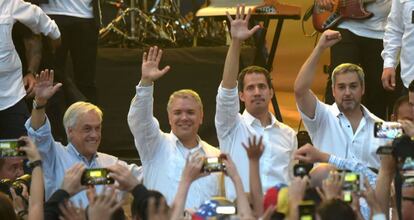From embracing Juan Guaidó to expelling him in the middle of the night: Colombia switches its stance on Venezuela
An international summit organized by President Gustavo Petro shows how the South American country’s foreign policy has drastically changed in recent months


The government of Colombian President Gustavo Petro has changed its foreign policy with respect to the situation in neighboring Venezuela. The organization of an international summit involving around 20 countries in Bogotá resulted in more words than actions — as well as a diplomatic crisis, with the unexpected arrival of Juan Guaidó, the leader of the Venezuela opposition, who, at one point, was recognized as the legitimate president of his country by more than 50 world leaders.
Unlike under the previous right-wing administration of Iván Duque, Guaidó was not welcome in Bogotá. The Colombian government’s new diplomatic strategy is attempting to lay the groundwork for Venezuela’s 2024 general elections — a position that is diametrically opposed to the sanctions against Maduro that were proposed by Petro’s predecessor.
Four years ago, the opposition leader was greeted as a hero at the Colombian-Venezuelan border. Three presidents received him — including former Colombian President Duque, who governed from 2018 until 2022 — and he attended the Venezuela Aid Live concert benefit, to raise funds to finance humanitarian aid. Today, the situation is very different: after a visit that was cut short, Colombian authorities forced Guaidó to board an overnight commercial flight bound for Miami. Allegedly, he had entered Colombia “in an irregular manner.”
Guaidó has long grown accustomed to making surprise appearances. In February of 2019, he showed up at the mega-concert in Cúcuta, Colombia, which was organized by Latin American politicians and artists during the failed attempt to get humanitarian aid to the Venezuelan people. At that point in time, Guaidó was recognized as the interim president of Venezuela by nearly 60 countries; he was able to cross the border in open defiance of prohibitions imposed by the Maduro regime. After more than a 30-hour-long journey by road, he was received on stage by President Duque of Colombia, President Sebastián Piñera of Chile and President Mario Abdo of Paraguay. The following day, the promised humanitarian aid was stranded on the bridge between Colombia and Venezuela, repelled by weapons and tear gas deployed by Venezuelan soldiers.
Following that incident, Maduro decided to break relations with Colombia, over what he considered to be a “foreign invasion.” Meanwhile, Guaidó carried on to Bogotá to attend a meeting of the Lima Group, an alliance made up of Canada and 13 Latin American countries created in 2017 to find a solution to Venezuela’s political, humanitarian and refugee crises. The meeting took place in Colombia’s foreign ministry — the same place where this past Tuesday’s summit took place. However, as opposed to four years ago, Guaidó was no longer welcome.
Duque’s administration attempted to impose a “diplomatic siege” to isolate the Chavista government in Caracas. One of the first steps Duque took was to withdraw his country from UNASUR — the Union of South American Nations, set up by Hugo Chávez — as the regional alliance was, in his words, “complicit in the Venezuelan dictatorship.” Duque’s administration also denounced Maduro before the International Criminal Court and pushed for the creation of the Lima Group. The former president offered unconditional support to Guaidó, who, as president of the shuttered National Assembly of Venezuela, was then recognized as interim president of the country.
These steps elevated tensions between Colombia and Venezuela, which share a 1400-mile-long border. The years of the Duque administration saw irreconcilable differences between Bogotá and Caracas, with Colombia receiving millions of Venezuelan refugees. Some point to the hardline strategy as having deepened the Venezuelan crisis. When Duque — who at one point warned that “Maduro’s days [were] numbered” — finished his term, Colombia-Venezuela relations were totally broken, with no open channels of communications.
However, Gustavo Petro — who began his mandate in August of 2022 — has used his first eight months in power to push for a policy that he calls “total peace.” His administration has proposed dialogue with various armed groups, including the ELN — the last armed insurgency in Colombia — and the dissident elements of the dissolved FARC. Petro’s efforts also include resolving the tensions with Venezuela.
Quickly after being sworn in, Petro re-established relations with Caracas, which hosted the first round of talks between the Colombian government and the ELN. Petro has met with Maduro on at least six occasions so far, proposing that Venezuela return to the Inter-American Human Rights System. His diplomatic offensive is meant to convince Maduro — who succeeded Hugo Chávez in 2013 — to sit down with the Venezuela opposition again to find a negotiated exit to the political and humanitarian crisis.
The recent summit that was convened in Bogotá was meant to jumpstart stalled negotiations on Venezuela. However, it has been viewed with deep suspicion by Latin American leaders who once supported Guaidó. A group of ex-presidents from the Liberty and Democracy Group — including former Colombian president Duque — noted that this summit “could validate the Venezuelan dictatorship’s interests.” The group of former presidents — who associate the government in Caracas with drug trafficking networks — also criticized “the exclusion of [Venezuelan presidential candidate] María Corina Machado and the expulsion of Juan Guaidó from Colombian soil,” deeming this to be “evidence of bias in favor of the [Venezuelan] dictatorship.” Some of the signatories included former Argentine president Mauricio Macri and former Chilean president Sebastián Piñera.
The latest “pink wave” that swept across Latin America in the past couple of years brought progressive governments to power in Colombia, Chile, Argentina and other countries, displacing presidents that used to make up the Lima Group. Meanwhile, in the United States, Donald Trump — who was a strong supporter of Guaidó — was replaced by Joe Biden, who recently hosted Petro at the White House. While awaiting more concrete results regarding the Venezuelan crisis, the Colombian government’s new position appears to be in line with changing times.
Sign up for our weekly newsletter to get more English-language news coverage from EL PAÍS USA Edition
Tu suscripción se está usando en otro dispositivo
¿Quieres añadir otro usuario a tu suscripción?
Si continúas leyendo en este dispositivo, no se podrá leer en el otro.
FlechaTu suscripción se está usando en otro dispositivo y solo puedes acceder a EL PAÍS desde un dispositivo a la vez.
Si quieres compartir tu cuenta, cambia tu suscripción a la modalidad Premium, así podrás añadir otro usuario. Cada uno accederá con su propia cuenta de email, lo que os permitirá personalizar vuestra experiencia en EL PAÍS.
¿Tienes una suscripción de empresa? Accede aquí para contratar más cuentas.
En el caso de no saber quién está usando tu cuenta, te recomendamos cambiar tu contraseña aquí.
Si decides continuar compartiendo tu cuenta, este mensaje se mostrará en tu dispositivo y en el de la otra persona que está usando tu cuenta de forma indefinida, afectando a tu experiencia de lectura. Puedes consultar aquí los términos y condiciones de la suscripción digital.








































